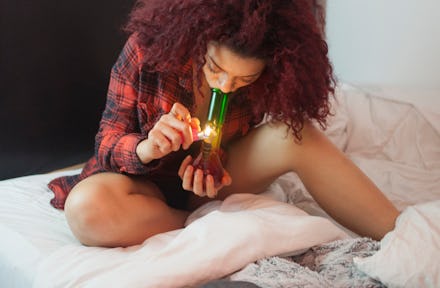Does weed really help you sleep? Experts separate fact from fiction

I used to swear by my nightly cannabis-infused mint, which I began taking at the recommendation of a friend and fellow light sleeper. Normally, I’d lie in bed, wide-eyed, for an hour before nodding off, only to stir awake in the middle of the night. But after popping my edible, a heaviness would settle into my muscles, and I’d probably take only 20 minutes to drift into blissful, uninterrupted sleep. I wondered, though, whether it was the edible, or my expectation that it would put me down. Can weed really help you sleep better?
Not really, experts tell me. For starters, the very claim that cannabis can help you sleep is an oversimplification of the substance, which Lewis Nelson, professor and chair of the department of emergency medicine and chief of the Division of Medical Toxicology at Rutgers New Jersey Medical School, says contains numerous compounds with various effects.
The very claim that cannabis can help you sleep is an oversimplification of the substance.
Each strain has a different profile of compounds. How cannabis affects your sleep, then, may depend on the strain you take. And, since everyone responds to the plant differently, it may also depend on your unique biology. Your mindset and your environment when you imbibe — a.k.a., the set and setting — also matter. People who say that weed helps them sleep should also consider what else is at play; have they also altered other aspects of their sleep hygiene and habits, who they sleep next to, or what they're doing during the say that might affect their sleep quality?
That said, in general, tetrahydrocannabinol, or THC, the compound behind the cannabis “high,” “can help people fall asleep easier,” says Yu-Fung Lin, an associate professor of physiology and membrane biology at UC Davis. Although another compound, the ever-trendy cannabidiol, or CBD, can promote alertness at low concentrations, it promotes sleep at high concentrations. So, a THC- and/or CBD-rich strains will likely have sedative effects, Lin explains.
When Lin uses the term "strains," she is indeed referring to the genetic makeup of cannabis. Different types contain different levels of THC, CBD, and other compounds. It should be noted that the whole strain conversation, including whether indicas are indeed very different highs than sativas, is up for debate — many scientists believe that those classifications are less "real" than we previously thought.
Lin says that THC exerts its sedative effects by acting on proteins known as cannabinoid receptors, specifically CB1 and CB2, in brain regions relevant to sleep. Meanwhile, CBD acts on other targets that are abundant in the brain to produce effects that further contribute to the regulation of sleep patterns. A class of compounds that give cannabis its taste and smell, terpenes, play a role, too. (Lin notes that the terpene responsible for lavender’s scent — which may promote sleep — is also present in cannabis.)
But while cannabinoids like THC and CBD might help you doze off faster, the sleep you get might not be restful, Lin says. She cites a 2017 review of previously-published studies, in which some found that cannabis may reduce the time it takes to fall asleep, while others showed that it alters sleep architecture, or the time spent in the four stages of sleep: three stages of non-rapid eye movement, or non-REM, sleep, followed by REM sleep, when most dreaming happens, per the National Institute of Neurological Disorders and Stroke. Each night, you pass through these stages many times.
Specifically, cannabis “reduces the amount of time you spend in REM,” Nelson says. “In general, you need an adequate amount of REM sleep to feel refreshed.” Both he and Lin say this could explain why taking cannabis at bedtime can leave some users — like me — feeling sluggish the next morning. It’s partly the reason why I eventually ditched my nightly cannabis mint; falling fast asleep within minutes just wasn't worth the brain fog. Alcohol and many sleeping pills also have this effect, according to Nelson.
He adds that there are no standard controlled clinical studies to support the use of cannabis as a sleep aid — that is, no studies that assigned some people to take cannabis at bedtime, and others a placebo, to ensure that any improvements researchers saw were due only to the cannabis. Stress reduction and relaxation techniques are more effective, he says, and they’ll actually leave you feeling like your fully rested, fully functional self. “The best sleep is natural sleep.”